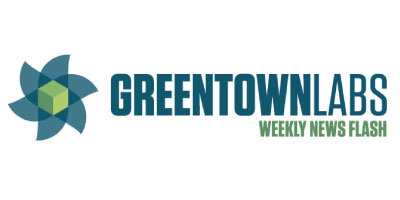
This week in clean energy news, the nation of Scotland made history with the amount wind power generated in the month of March. New York City announced programs to implement the spread of electric vehicle use. In other news, new technologies and discoveries were made that have the potential to dramatically increase the efficiency of some established forms of renewable energy. Finally, a popular product you might not associate with clean energy is proving to be valuable in the industry.
What news did you been reading last week? Share with us @GreentownLabs!
CleanTechnia– Scotland Sets Massive New Wind Power Record In March, Meeting 136% Of Households’ Needs
-
Scotland set a record for renewable energy in the month of March by producing an enormous amount of wind power. In fact, turbines produced enough electricity to power 136% of Scottish homes for the month. The record setting output was 81% higher than this time last year.
“As well as helping to power our homes and businesses, wind power supports thousands of jobs and continues to play an important role in Scotland’s efforts to address global climate change.”
CleanTechnia– New York Governor Launches $70 Million Electric Car Rebate & Outreach Initiative
-
The state of New York announced an electric vehicle rebate program worth $70 million . The initiative seeks to encourage buyers to choose greener transportation options and raise awareness about climate change. The recently announced incentive will lower the cost of purchasing electric vehicles for consumers and is expected to dramatically increase the number of EV’s in the state.
“Reducing vehicle emissions is a critical part of this administration’s efforts to fight climate change and reduce New York’s carbon footprint,”
CNBC– Huge wind turbines are to combine with hydropower in a German forest
-
German engineers are developing systems that will combine two of the most popular forms of renewable energy, wind and hydropower. GE is set to build what it describes as “the world’s tallest and first ever wind turbine integrated with pumped storage hydro-electric power.” Construction on the project has begun and is expected to be completed by early 2018.
“When the demand for electricity is high you can release water from the reservoirs that are held around the base of the turbines down the hill, through the turbines and into the reservoir.”
Renewable Energy World– Facebook, Microsoft Helping to Finance Green Power Microgrids
-
Through The Microgrid Investment Accelerator, Facebook and Microsoft will mobilize $50 million to establish energy access programs in Indonesia, India and East Africa. As solar panels and other renewable energies become less expensive, the use of microgrids is dramatically increasing. The corporations are seeking to use microgrids to provide access to electricity for those who are not connected to the national grid. Executives believe the initiative will promote business while simultaneously advancing the corporate social responsibility efforts.
“The Microgrid Investment Accelerator will not only be a powerful tool in driving much-needed capital into projects, but will also help to bring down costs, build a stronger ecosystem, and catalyze innovation.”
Forbes– Bud Boss Promises ‘Greener’ Beer In Big Shift To Renewable Energy
-
Anheuser-Busch is the world’s largest producer of beer and one of the most prominent consumers of energy in the beverage energy. In an effort to promote sustainability, CEO Carlos Brito has promised to implement 100% renewable energy in their production processes by 2025. The company uses roughly $400 million of energy resources each year, highlighting and incredible opportunity for clean energy investment.
“In some markets it’s cheaper to do this route. It makes business sense and it lessens the environmental impact.”
Greentech Media– How Amazon Could Boost Renewable Energy Use in Europe
-
Most are familiar with the Amazon Echo, a voice controlled home entertainment system, capable of ordering products with voice commands. But did you know that the Echo is increasing the usage of green energy in European households? Smart energy controls have failed to catch on because people forget to order supplies or find the process of reordering inefficient. The Echo allows customers to order accessories by simply asking the device.
“It’s more the convenience and the comfort. But for the mass market, energy savings will be one of the key criteria.”
ATTN:- How the World’s Blackest Material Could Improve Solar Energy
-
Vantablack, the world’s blackest material is composed of millions of carbon nanotubes and could improve the efficiency of solar panels. The product is capable of absorbing 100% of visible, ultraviolet and infrared light. Applying it to photovoltaic cells could limit the amount of sunlight that bounces off panels. While the product is not commercial yet, it has received widespread interest from renewable energy companies.
“We have demonstrated that in winter Helsinki, black cells generate considerably more electricity than traditional cells even though both cells have identical efficiency values.”


